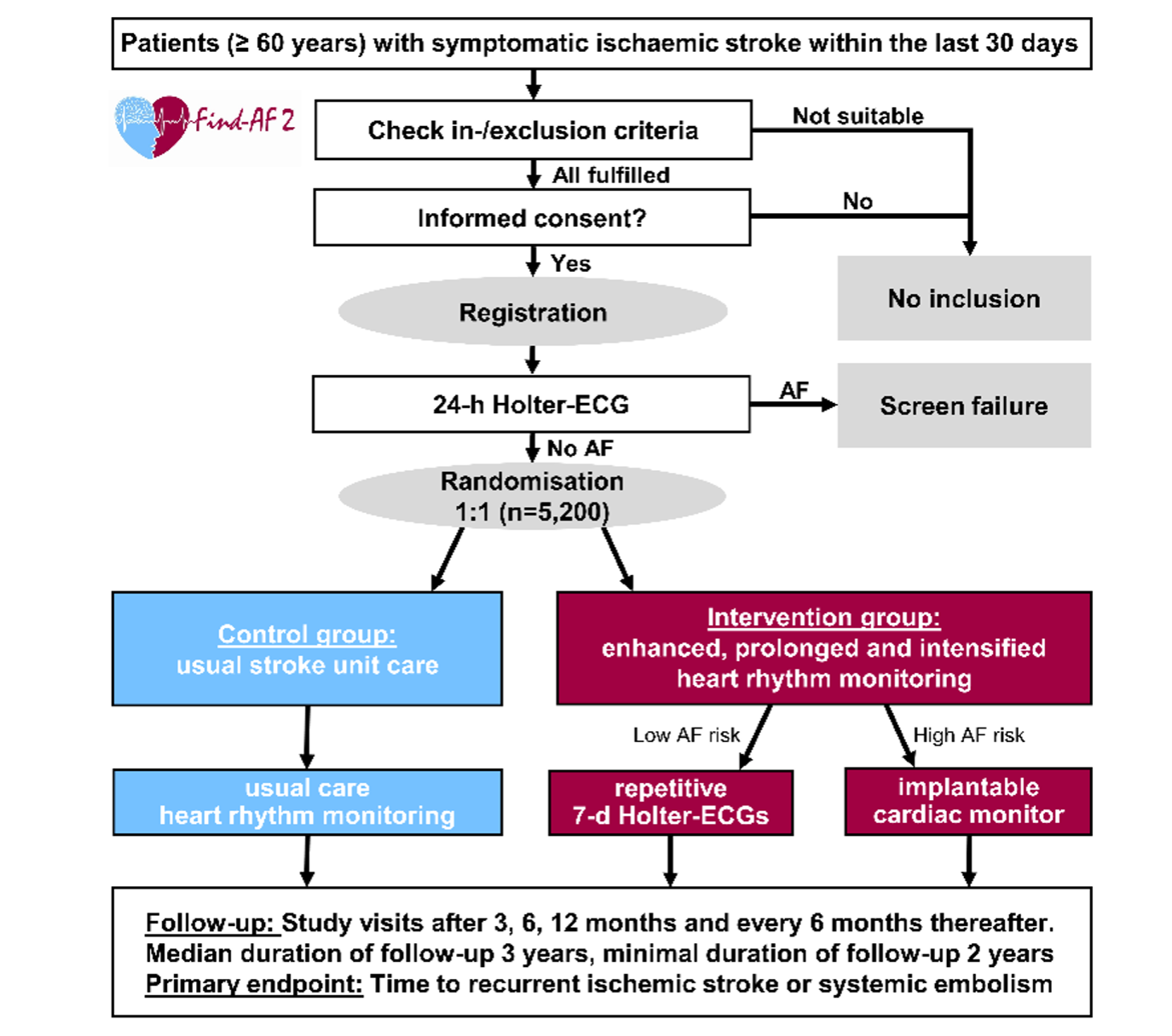Clin Res Cardiol (2023). https://doi.org/10.1007/s00392-023-02180-w
|
|
Rationale and design of the Find-AF2 trial: Enhanced, prolonged and intensified heart rhythm monitoring to decrease ischemic stroke and systemic embolism
|
|
R. Wachter1, T. Uhe1, K. Wasser2, M. Weber-Krüger3, W.-R. Schäbitz4, J. Brachmann5, U. Laufs1, M. Dichgans6, G. Gelbrich7, D. Petroff8, C. Prettin8, M. Köhrmann9, K. Gröschel10, M. Wagner8, für die Studiengruppe: Find-AF2
|
|
1Klinik und Poliklinik für Kardiologie, Universitätsklinikum Leipzig, Leipzig; 2Universitätsmedizin Göttingen, Göttingen; 3Herzzentrum, Klinik für Kardiologie und Pneumologie, Universitätsmedizin Göttingen, Göttingen; 4Ev. Krankenhaus Bethel, Universitätsklinikum OWL, Bielefeld; 5Medical School / Regiomed GmbH, Coburg; 6Institut für Schlaganfall- und Demenzforschung, LMU München, München; 7Institut für Klinische Epidemiologie und Biometrie, Universitätsklinikum Würzburg, Würzburg; 8Zentrum für Klinische Studien, Universität Leipzig, Leipzig; 9Klinik für Neurologie, Universitätsklinikum Essen, Essen; 10Klinik und Poliklinik für Neurologie, Universitätsmedizin Mainz, Mainz;
|
Background: Atrial fibrillation (AF) is one of the most frequent causes of stroke. Several randomized trials have shown that prolonged monitoring increases the detection of AF, but the effect on recurrent cardioembolism, i. e. ischemic stroke and systemic embolismis unknown. We aim to evaluate whether a risk-adapted intensified heart rhythm monitoring with subsequent initiation of oral anticoagulation (OAC) leads to a reduction of recurrent cardioembolism.
Methods: Find-AF 2 (NCT 04371055) is a randomized and controlled open-label parallel group multicenter trial with blinded endpoint assessment funded by the German Research Foundation (DFG). 5,200 patients ≥ 60 years with symptomatic ischemic stroke within the last 30 days and without known AF nor (contra-)indications for OAC will be included at approximately 50 study centers in Germany. Patients without AF in a 24-hour Holter-ECG will be randomized in a 1:1 fashion to either enhanced, prolonged and intensified ECG-monitoring (intervention arm) or standard of care (control arm). In the intervention arm, patients with high risk of underlying AF will receive an implantable cardiac monitor (ICM) for continuous rhythm monitoring whereas those without high risk of AF will receive repeated 7-day Holter-ECGs. Patients will be followed for at least 24 months. The primary efficacy endpoint is time until recurrent ischemic stroke or systemic embolism.
Current status: First patient in was July 7th, 2020. As of Nov 20th, 2022, 2,740 patients (53 % of target) have been randomized by 50 active study centers in Germany.
Conclusion:Find-AF 2 will evaluate whether an enhanced, prolonged and intensified rhythm monitoring reduces recurrent ischemic stroke or systemic embolism by earlier and more sensitive detection of AF with subsequent prescription of OAC in patients with recent ischemic strokes.


|
https://dgk.org/kongress_programme/jt2023/aP476.html
|